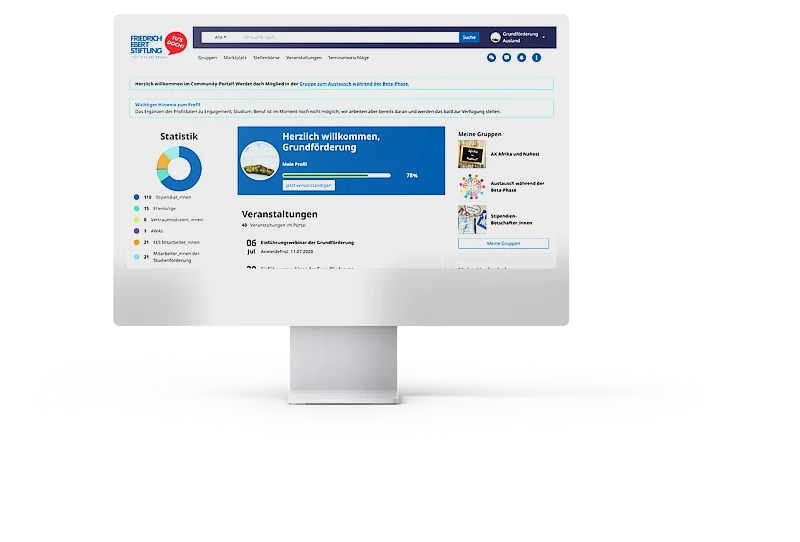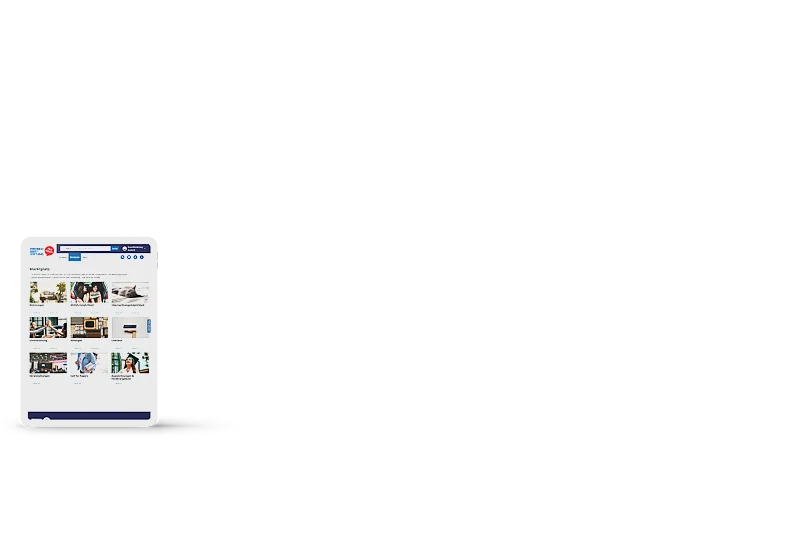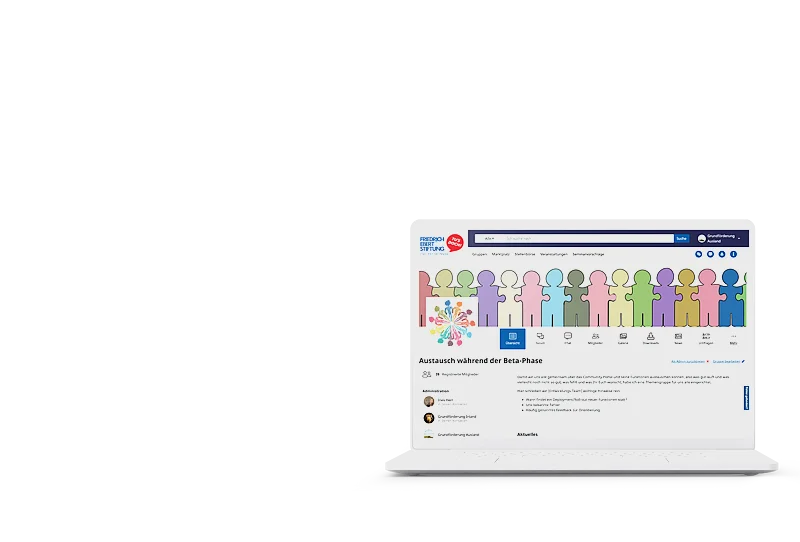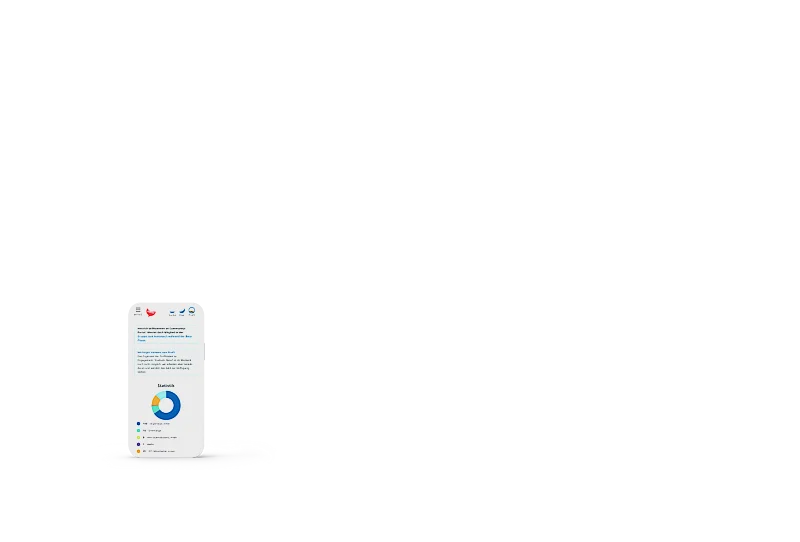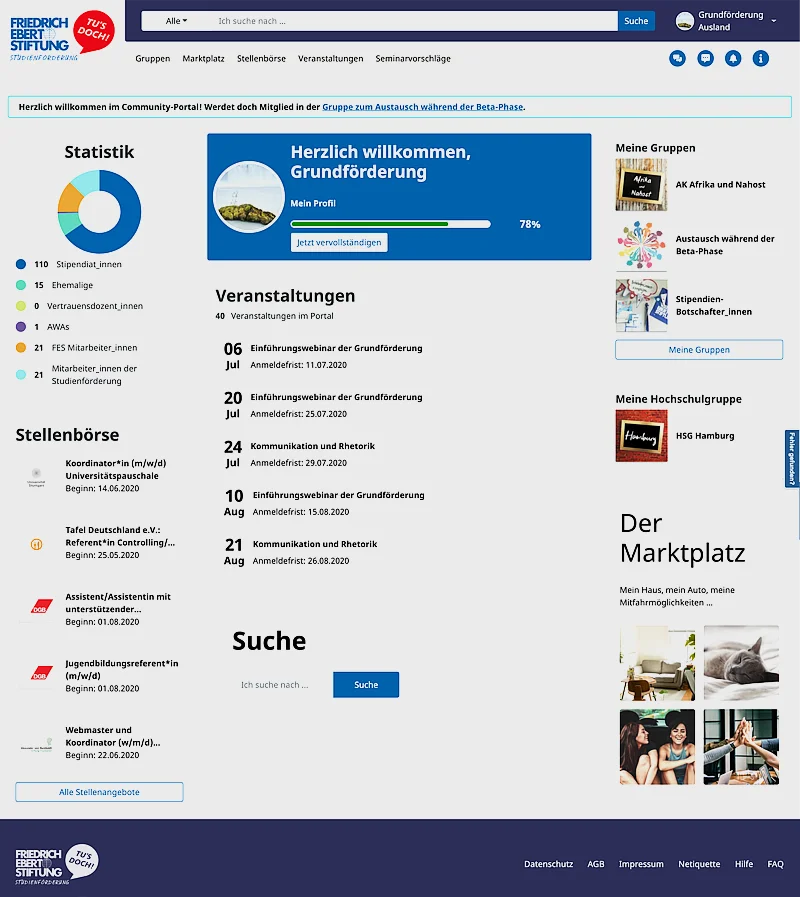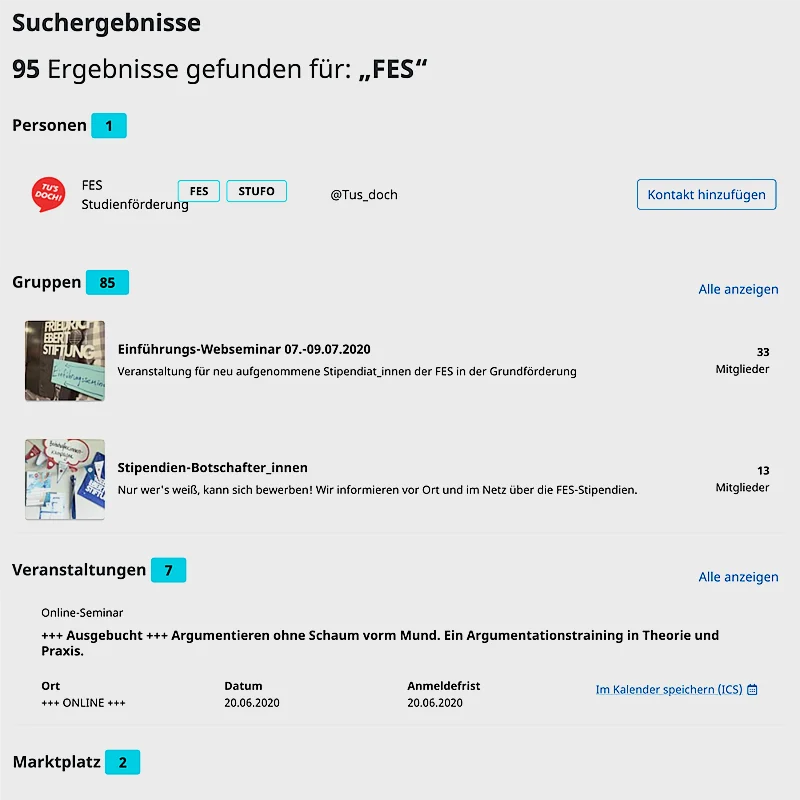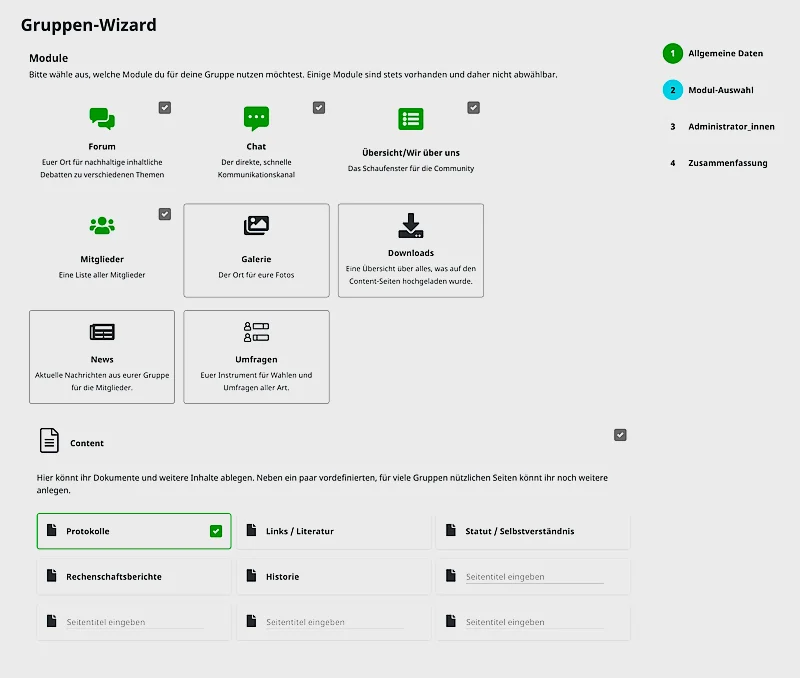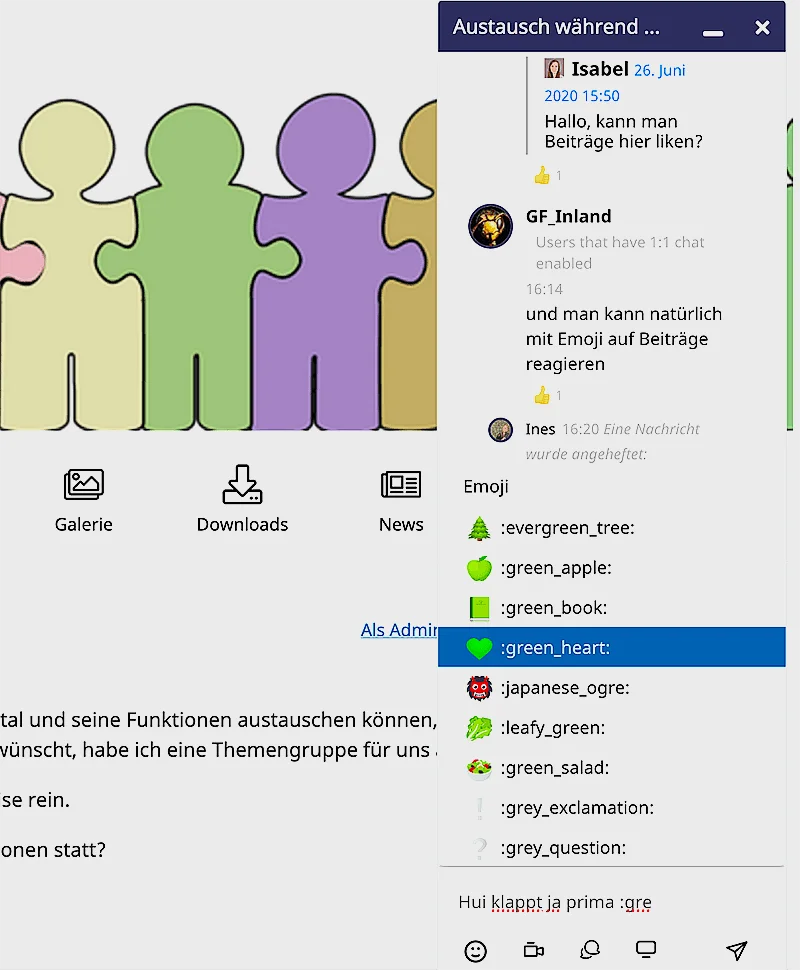Social Community for the Friedrich-Ebert-Stiftung
In 2018, the Friedrich-Ebert-Stiftung (FES) was looking for a new collaboration and social media community platform and, after an evaluation round, decided to publish the development of the new platform for around 22,000 users (scholarship holders, alumni, lecturers, FES employees and study support staff) as part of an international tender.
The at that time still quite young agency group FGTCLB, under the leadership of web-vision Managing Director Boris Hinzer, was able to prevail over the market competitors in the tender process and finally start in the fall of 2018 with the agile software project according to Scrum methodology.
Oracle Database Connection, Single Sign-On and DSGVO
The FES has a large number of database applications in its in-house computer center for processing by internal staff. In addition to the administration of personal data, publications and materials, event and conference data, information on study grants and scholarships is also available in Oracle databases.
During the development, different interfaces to the Oracle databases were therefore created, which can securely retrieve and write the user data and required information via a separate interface application, at the runtime of the portal.
Special attention was paid to compliance with the German Data Protection Ordinance (DSGVO) and data security in general, so that, for example, no personal data is stored in the TYPO3 database.
As an elementary building block for the community portal, a TYPO3 extension was developed that enables TYPO3 to operate as an Oauth2 provider for external services with corresponding single sign-on. This extension was published free of charge on GitHub for the TYPO3 community according to the open source idea.
Community with extensive user profile and privacy settings
Before the user enters the FES community portal, he goes through a short onboarding process where, in addition to the usual legal matters, he can also define personal settings such as his profile picture or his user name.
After logging in, the user then has the opportunity to change and supplement a variety of personal information, some of which is already provided by the FES Oracle database, according to his or her own wishes via his or her user profile.
In addition to the usual master data, information about the user's social commitment, studies and profession, as well as private information such as interests, languages or hobbies are available.
The integrated privacy settings allow a fine-grained configuration for the personal information the user can share with other community members in his public profile.
The dashboard is certainly one of the special highlights of the FES Community Portal. In the upper area of the dashboard, important system messages and notifications of student support are prominently displayed. These messages can be easily managed via the TYPO3 backend.
On the dashboard, the user receives the most important information from the individual modules at a glance, clearly prepared and displayed in widgets. The information displayed is compiled individually for each user and thus serves as an entry point for the integrated job exchange, the marketplace and the groups in which the user is a member.
The centrally positioned information for events is always up-to-date and is fed by the event database of the Friedrich-Ebert-Stiftung. The statistics widget shows the number of registered user groups in the community portal.
The integrated Apache Solr search server provides error-tolerant search suggestions already during the user's input. On the search results page, the hits found are addressed and displayed in a different way according to content type.
The groups provide the central starting point for members of the portal to exchange information on specific topics, interests or work groups and to work together on and in these virtual work areas.
Based on their different university affiliations, members are provided with corresponding university groups to which they are automatically assigned. Other groups for working groups or committees are also made available to users according to the affiliation of their members.
Own topic groups can be created independently via a 4-step group wizard and equipped with initial information, content pages and modules. As prepared modules thereby a forum, the integrated on-line Chat, we over us, a member list, gallery, Downloads, news and inquiry are available.
All content can be easily added and edited by the administrators and members of a group via the frontend editing of the portal.
Nothing works without communication!
A community portal or social media network without communication options? Unthinkable!
Therefore, based on the Oauth2 integration for TYPO3, both the online chat and the forum were connected on the basis of external systems and suitably integrated and adapted into the portal for the Friedrich Ebert Foundation. When evaluating the two systems, it was particularly important to the Scrum team not to reinvent the wheel and fall prey to the "Not Invented Here" syndrome so popular in open source projects.
For the forum integration, the team decided to use Flarum, which is similar to the popular discussion platform Discourse, but is available as open source based on the PHP programming language.
Flaum was integrated into the groups in such a way that after the creation of a new group, a corresponding discussion forum is automatically available. The members of the group are automatically synchronized with Flarum, even if they join or leave the group later.
The popular Slack alternative RocketChat was chosen as the online chat solution. For the chat integration, special attention was paid to a high degree of usability. The chat is available to users either in a separate browser tab or as an inline chat embedded in the portal which, similar to facebook messenger, is superimposed on the portal content and can be expanded and collapsed.
As with the forum, users are of course automatically synchronized. Both systems can be used seamlessly by members of the platform via single sign-on.
Other community modules: Marketplace and job board
The portal has a marketplace in which registered users can independently post new offers and requests under the headings of apartments, carpooling, overnight accommodation, support, miscellaneous, literature, events, call for papers, and awards & funding offers.
In addition, job offers and requests, as well as internship offers and requests are available in the separate job exchange. Both marketplace and job exchange are built on the same technical basis and developed modularly, so that new categories can be easily added in the future.
Usually, scholarship holders can submit proposals for seminars or workshops once a year, for which they can register themselves and other community members for implementation with a seminar profile. This first phase is the so-called seminar proposals, which are submitted in a definable time window and in different categories.
The submission phase is followed by the review and correction phase by the study support of the Friedrich-Ebert-Stiftung. Here, similar seminar proposals are combined, corrections are made and different submitters with the same interests are brought together.
This phase is followed by the actual selection, in which the scholarship holders can vote for the seminars that interest them. Depending on the category, a predefined number of votes can be cast, so that finally, after the voting phase, the result is automatically published.
Finally, the complete election process, including submissions and votes, can be made available in an archive for subsequent years.
Friedrich Ebert Stiftung
The FES is Germany's oldest political foundation. It is named after Friedrich Ebert, the first democratically elected president of the German Reich. As a party-affiliated foundation, its work is guided by the fundamental values of social democracy: freedom, justice and solidarity. Around 670 employees work at the headquarters in Bonn and Berlin, in 15 state and regional offices across Germany, and in more than 100 foreign representatives.


